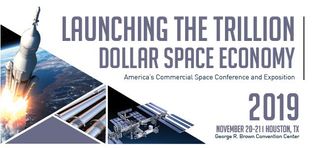
Every Company Is a Space Company, Some Just Don't Know it Yet! (Op-Ed)
The best long-term investment for companies and the world? The space business.

James Causey is the executive director of SpaceCom, the annual commercial space conference and exposition. He has more than 40 years of diverse business experience, including acquisitions, divestitures, strategic communications and biotech. Through his work at SpaceCom, he seeks to cultivate a culture of innovation and excitement about the burgeoning commercial space industry by bringing together business executives and the best innovators in the space industry to discuss ways to build sustainable commercial activities using space technology. SpaceCom is hosted annually by the city of Houston in collaboration with NASA, the Johnson Space Center and the Houston Economic Development Community. Causey contributed this article to Space.com's Expert Voices: Op-Ed & Insights.
When you pick up your cellphone, you are interacting with the space economy. Your phone's capability was derived from space technology and relies on satellite connection for various communication and GPS functions.
A remarkable transformation has occurred in the past few years that many businesses and people are only marginally aware of — outer space has become an indispensable part of the value chains for many business sectors.
A revolutionized space capability is made possible through a combination of smaller satellites, launch cost reductions and advanced software analytics — and the resulting applications are just the beginning of what is yet to come.
Related: NASA's Moon Push and International Opportunities Take Center Stage at SpaceCom 2019
Many research firms and investment houses are predicting a several trillion-dollar commercial space market within 10 to 15 years — wow! Can you afford to not know about what is going on?
Traditionally, this market has been dominated by communications and navigation satellites that currently generate more than $350 billion in annual revenue.
Get the Space.com Newsletter
Breaking space news, the latest updates on rocket launches, skywatching events and more!
While the fast-emerging commercial space market will certainly continue to include these two types of satellite services, the growth is coming from other areas as well.
How will farmers know where and how much to fertilize their crops? A satellite-enabled service allows for daily, weekly or monthly readings of the fields, giving farmers a tool to help save fertilizer, water and time — and one that yields a hefty return!
How can a tanker save bunker fuel as it crosses the Pacific? Maritime transportation can be made more efficient and cost-effective by taking advantage of ocean currents and changes in the weather, or the type of data that is provided by an international fleet of Earth observation satellites.
Related: How Weather Satellites Changed the World
There are hundreds of satellite applications at affordable prices all because of our space program and the partnership between NASA and its commercial space partners.
But it is not just these new space-based services that are important to understand and know about. The lessons and new technologies we have developed as a result of our space program have been astounding. Medical breakthroughs that save lives, water filtration systems that are portable and can help families in remote locations, lightweight materials and miniaturization of products are equally valuable.
It does not stop there. The economic benefit to those regions involved in the commercial space market are astonishing as well. Recent studies in Houston have shown the extraordinary value of having NASA's Johnson Space Center as part of the community. Many other regions of the U.S. are seeing this value as are many countries. Some of these countries are very small — Portugal, Ecuador, French Guiana are all involved in exploring ways to take advantage of the opportunities.
Five years ago, NASA's Johnson Space Center understood the importance of having a forum for all of these exciting changes to be discussed and disseminated to interested parties. The result was the creation of SpaceCom, America's Space Conference and Exposition. SpaceCom is an annual two-day event hosted at the George R. Brown Convention Center and will take place Nov. 20 and 21.
You are part of the commercial space economy. Why not make some money off it by understanding how it all works?

- Spread the Word: Space Development Benefits Earth (Op-Ed)
- How Will Private Space Travel Transform NASA's Next 60 Years?
- Space Exploration is Not Just for Billionaires
Follow us on Twitter @Spacedotcom and on Facebook.

Join our Space Forums to keep talking space on the latest missions, night sky and more! And if you have a news tip, correction or comment, let us know at: community@space.com.

James Causey is the Executive Director of SpaceCom, a commercial space conference and exposition. He has more than 40 years of diverse business experience including acquisitions, divestitures, strategic communications and biotech. He earned a bachelor's degree in civil engineering from Leeds Beckett University in 1975 and an MBA in Finance and International Business from the University of Maryland, College Park in 1977. As the Executive Director of SpaceCom, he has leveraged his decades of professional experience and education to cultivate a culture of innovation and excitement about the burgeoning commercial space industry. With the predicted value of this sector in the trillions of dollars, he has created an annual event that brings together business executives with the best innovators in the space industry to discuss ways to build sustainable commercial activities using space technology on Earth and optimizing suborbital and low Earth orbit environments for new commercial space customers. SpaceCom is hosted annually by the city of Houston in collaboration with NASA, the Johnson Space Center and the Houston Economic Development Community.
Most Popular


